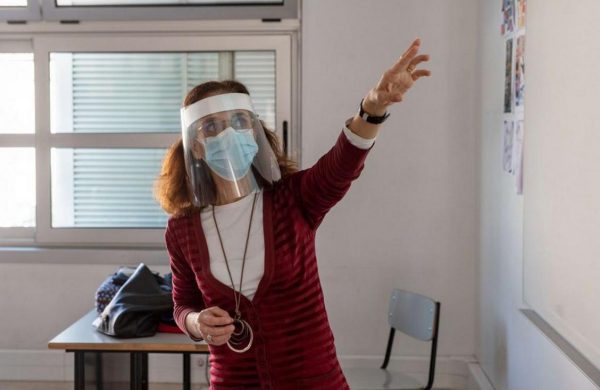 Students come to the aid of teachers, just as medical students came to the aid of doctors in the spring. Is there a danger in this, will students of pedagogical universities receive money for their internship and what will their lessons look like? “Pravmir” talked about this with Igor Remorenko, Rector of the Moscow Pedagogical State University, whose students begin their internship at Moscow schools.
Students come to the aid of teachers, just as medical students came to the aid of doctors in the spring. Is there a danger in this, will students of pedagogical universities receive money for their internship and what will their lessons look like? “Pravmir” talked about this with Igor Remorenko, Rector of the Moscow Pedagogical State University, whose students begin their internship at Moscow schools.
“Someone said that nearly 3 thousand students will help schools. Is this true?”

Igor Remorenko
“The situation has changed somewhat due to the fact that children from 6th to 11th grade still study online. Therefore, there is no need to get the maximum number of students to support teachers aged 65+.
We have those fourth-year students who would have taken an internship at schools anyway [at this time of year]. So today, we are talking about hundreds, not thousands.”
“What is the novelty in what is happening now then?”
“What’s new is, perhaps, the fact that students will not conduct classes alone by themselves (except for some subjects of study), but together with school teachers.”
“In other words, children will be in the classroom, there will be a screen in front of them with their teacher on it, and also a student as a tutor in the class? In such tandem?”
“After all, we are talking about students, who perform some tutoring functions, in addition to their main tasks. Teachers concentrate on the presentation of new material, and the interns discuss it with the school students, divide them into groups, ask questions, help them formulate their own opinion on the topic and so on.”
“Critics of this model say that the role of the student in this case will be reduced to monitoring the discipline in the class.”
“I agree their task isn’t exactly to monitor discipline. This is not an end in itself. Discipline is at its best only when there is a common interest. Without serious occupation, it either does not exist, or it is only a consequence of blind obedience.”
“Do parents of children from 1 to 5 grades now have an opportunity to choose: take their children to school or study remotely?”
“Usually students from 1 to 5 grades study at school. But it all depends on the school’s director and how he or she organizes the work.”
“We have dissatisfied students”
“Can a student help remotely?”
“Yes, theoretically, such a form is possible, although we have not planned it yet. According to our plan, we still have live internship, which today turns out to be combined and mixed: there are both live and remote formats.”
“Were there students who were unhappy with the fact that they were “put on the spot”? For example, some medical students refused to go to covid zones in spring.”
“Of course, there have been dissatisfied students. Yesterday I answered numerous incoming questions. During this time, we decided to organize such video conferences in the evenings with the students.”
“What is the students’ main concern?”
“They are concerned that they will be given a lot of hours at schools and that they will not have time for their other activities and for reflection on what they are experiencing at the moment. Previously, it was assumed that they would create analytical texts, based on the results of their internship, which, among other things, would become part of their thesis.”
“Does it mean that this is more of an organizational and educational concern, which isn’t related to health?”
“They are concerned about their health as well, especially those who has elderly relatives.
But we discussed with them that in any case, whether they go to school or not, they will have to take every precaution. It doesn’t make much difference if they take public transport to university classes or to school. Those who’ll take an internship at a school that is close to their home might even be safer [from contracting coronavirus -Tr].”
“If a student refused to go to school, will there be consequences?”
“We won’t be able to count it as a passed internship. Internship is part of the academic program. If a person has not taken it, we can expel them. But there is an opportunity to take academic leave of absence, and we have such cases.
I’ll say it again. This is not some kind of extraordinary work that requires a radical revision of the curriculum. We are changing the internship program itself somewhat, because a combined learning regime appeared, but everything is actually going according to plan.”
Combination of “live” and digital technologies
“Will students receive money for this?”
“No, they won’t be paid for the internship, but quite often senior students after internship receive an offer to teach some hours at school and combine study with work.
Legislation now allows them to do this, which is great. I myself started working in my third year at the university.”
“What competencies do students lack in order to teach remotely? After all, no one taught them this, teachers of the older generation also do not know it well.”
“Many of my colleagues believe that the basic competence is software ownership, but I disagree with them. Programs are being updated and improved all the time, that’s not the point.
But essentially one needs to be able to highlight some of the system-forming components in the educational material. Well, for example, in mathematics, if the meaning of the derivative [as a complex construction: the limit of the ratio of the function increment to the argument increment] is not understood, then the rest of the differential calculus makes as much sense as playing solitaire or putting together a puzzle, only with some manipulation of abstract objects.
It is very important to be able to find and achieve understanding of some key concepts in different educational programs. In distance learning, this competence becomes a hundredfold more important.”
“There is an opinion that the disadvantage of our distance education is that the methods that existed offline are simply mechanically transferred to digital, which is meaningless.”
“Naturally, today there is some kind of intellectual gap between face-to-face teaching and distance education. High-quality teaching requires direct human relationships, views, emotions, and a lively discussion. Opportunities, as psychologists say, the eureka effect, when you realize something, you shout “Eureka!” All this is hard to transfer online.
But there are ways when, for example, you form groups, first check your understanding together in small groups, write reports, have arguments. All this is possible remotely, and it helps a lot to advance. Although it works better in face-to-face discussion.
At the same time, the development of some routine skills, such as trainings for memorization, for solving a certain class of skill tasks, and for constructing various objects, are sometimes quite successfully mastered in electronic environments. The future belongs to the combination of “live” and remote technologies.”
Translated by pravmir.com

















